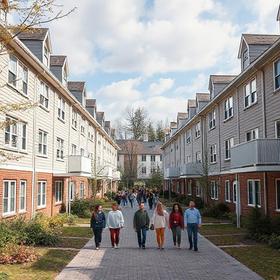It's a loaded statement, isn't it? Truthfully, there is no secret to getting your child into boarding school. Getting your child into boarding school requires three things: a desire for that type of education, a well-organized, systematic approach for following the required steps in the admissions process, and the flexibility to follow the advice of professionals who know their schools.
Why should you consider boarding school as opposed to keeping your daughter in your local high school? Review some of the talking points which I mention in this article. These are much more important than they appear at first glance. You must discuss this drastic change of schools with your child, on her terms, and on her level. Leaving public school to go to boarding school must be her idea. Parents who make major decisions affecting their children unilaterally risk creating serious emotional issues later on. So, before you broach the idea of sending her off to boarding school, think through what you are going to say and her reaction to your words.
As you begin thinking about private schools, add you will schools from various sources to your initial list of potential schools. That’s fine. Accept all suggestions and advice in the early stages of your search for the right school or schools. Friends will suggest schools which their children attend. Family members will mention schools that your uncle or aunt attended. And so on. Finally, you will explore on your own. Boarding School Review is a great place to start because the site is devoted to the approximately 300 boarding schools in the United States and Canada. Typically, you will end up with a list of 10-20 schools. Simply enter the school name or part of it in our search engine to find the detailed profile.
1. Don’t put all your eggs in one basket.
What am I talking about? I am cautioning you to include two safe schools on your shortlist. By the way, you create that shortlist by eliminating schools on that first list of 10-20 schools. Safe schools are schools that you know your child can get into. Don’t forget that private schools do not have to admit your child and, furthermore, they don’t have to give any reason for not admitting her.
The other schools on your shortlist can be more competitive schools. That’s up to you. For example, if you have always dreamed of your child attending Exeter, then go for it. If Exeter rejects her, at least you will have a couple of fine schools which will have accepted her. They may not be Exeter, but she will do just fine wherever she goes.
How do you determine how competitive schools are? Once again, Boarding School Review builds those metrics into its profiles of the private schools in its database. Let's look at two boarding schools in Massachusetts to illustrate acceptance rates and how to find them in our boarding school profiles.
The acceptance rate for Deerfield Academy in Deerfield, Massachusetts, is 17%. That makes Deerfield a competitive school. Column 1 shows data for Deerfield. Column 2 shows the data for all boarding schools
Middlesex School in Concord, Massachusetts has an acceptance rate of 18%. Middlesex is also a competitive school. Now, let's look at another boarding school.
Salisbury School in Salisbury, Connecticut has a 33% acceptance rate.
Note: the data given in the screenshots for Deerfield Academy, Middlesex School, and Salisbury School is from 2017
Create a balanced shortlist.
This is the reason why you need to balance your shortlist to avoid applying only to competitive or very competitive boarding schools. So, following that logic, let's assume that you create a shortlist containing one school which is very competitive, three schools that are much less competitive, as well as one school which is not as competitive as the others on your list. In case you are thinking that I am suggesting that you rank schools, I am not suggesting that. What I am suggesting is that you be realistic as you develop your shortlist of schools. The chances of your child getting into five very competitive schools are much slimmer than your child's acceptance at one of the schools on a balanced shortlist such as I have suggested that you develop.
Once you have developed that balanced shortlist, you must visit each school on that list. Using the schools which we looked at above, you could visit Deerfield, for example, and discover that it has everything you are looking for. At the same time, Deerfield reviews your child’s admissions profile and determines that she is the kind of student they are looking for. Furthermore, your child’s profile scores in the top 25% of all applicants. Now, things don’t always work out that way. You and I have no idea what any given year’s applicant pool will look like at any given school. The variables are endless.
2. Match schools with your needs and requirements.
Frankly, I consider this the most important step in identifying the right boarding school for your child. Each private school is unique. Each school offers its own academic curriculum which usually exceeds any state requirements. Each school has its own athletic program and extracurricular activities. This makes it difficult to compare private schools. Each is unique. It is up to you to figure out which schools best suit your needs and requirements.
Make sure schools match your specific needs. For example, if you have a child who has a mild learning disability you will want to confirm that the boarding schools on your list have experienced, professional staff, and curricula in place to take care of your child’s needs. Similarly, if you have a child who has autism spectrum disorder, you will want to make sure that the school has the professional staff to teach your child. While most boarding schools have small classes, most of the time children with special needs thrive with 1 on 1 teaching. Make sure that the schools which you are evaluating offer the individual instruction your child needs.
In any case, once you have established your needs and requirements, then you need to find schools that will be good matches for your needs and requirements.
3. Consider hiring an educational consultant.
As you probably have begun to realize, finding the right boarding school is a multi-faceted process that takes plenty of time to complete. You should plan on investing about 50-60 hours in the research part of the project. Add another 24-48 hours per school visit, assuming that you are visiting schools that are located within 2-3 hours from your residence. That is the main reason why I recommend that you consider hiring an educational consultant. The Independent Educational Consultants Association (IECA) has a list of well-qualified consultants to choose from. The bottom line is that consultants know their schools. They have active networks of admissions professionals. They will be able to match your child’s admissions profile to schools that will be a good fit with your requirements.
If you think that you would rather not spend money for a hefty professional fee, then ask yourself if you would buy a house without having an attorney review the contracts. Would you draft your own will? Professional educational consultants are worth every dollar. I know. I have done the school search process both ways. Once without a consultant. Once with. Without a consultant we naively applied to schools we liked, never thinking that our daughter’s admissions profile had to match the schools’ requirements. We applied to five schools. She was accepted at one. The second time, we hired a consultant. He took the time to listen to our needs and requirements. But he also understood the schools’ requirements. The yield was much better with three schools sending acceptance letters.
In conclusion, make sure your short list of boarding schools has schools in all three categories of competitiveness: reach, match, and safe.
Questions? Contact us on Facebook. @boardingschoolreview




















